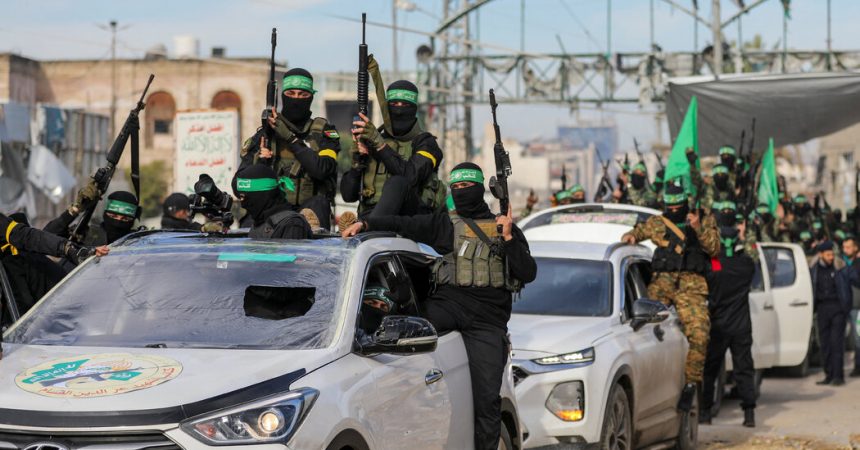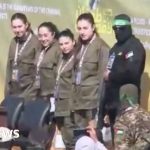Hamas handed over to the Red Cross on Saturday four female soldiers held hostage in Gaza as part of the cease-fire deal with Israel, which is poised to release 200 Palestinian prisoners in exchange.
The swap is seen as a crucial test of how the 42-day cease-fire deal between Israel and Hamas will develop in the coming weeks. Mediators hope the agreement will become the foundation for a permanent end to the devastating war in Gaza.
In scenes streamed live on Al-Jazeera and watched breathlessly in Israel, Hamas fighters marched the four soldiers onto a makeshift stage in downtown Gaza City, surrounded by a cheering crowd. After an impromptu handover ceremony, the armed and masked men handed the women over to the International Committee for the Red Cross.
The four women were taken captive more than a year ago du/ring the Hamas-led attack on Oct. 7, 2023, in which roughly 1,200 people were killed and 250 were taken hostage, according to Israel. In response, Israel launched an intense bombing campaign that Gaza health officials say has killed at least 45,000 people.
On Friday, Hamas identified the four hostages it would release as Karina Ariev, 20; Daniella Gilboa, 20; Naama Levy, 20; and Liri Albag, 19. All four were abducted from the military base near Gaza where they had been serving during the Hamas-led attack.
Under the terms of the deal, which went into effect on Sunday, Israeli forces are also expected to partially withdraw from a major zone in central Gaza after the swap, enabling hundreds of thousands of Palestinians displaced by the fighting to return to their homes in northern Gaza.
As part of the agreement, Hamas agreed to release 33 hostages of the nearly 100 remaining in Gaza. So far it has released seven, including the four from Saturday. Israel will free over 1,500 Palestinian prisoners in exchange.
Many of the 200 Palestinian prisoners that Israel is scheduled to release on Saturday are serving life sentences for involvement in attacks against Israelis. Around 70 will be exiled abroad as part of the agreement and will not be allowed to return to their homes in the West Bank and Jerusalem, according to a list provided by the Palestinian authorities.
Rawan Sheikh Ahmad contributed reporting.







